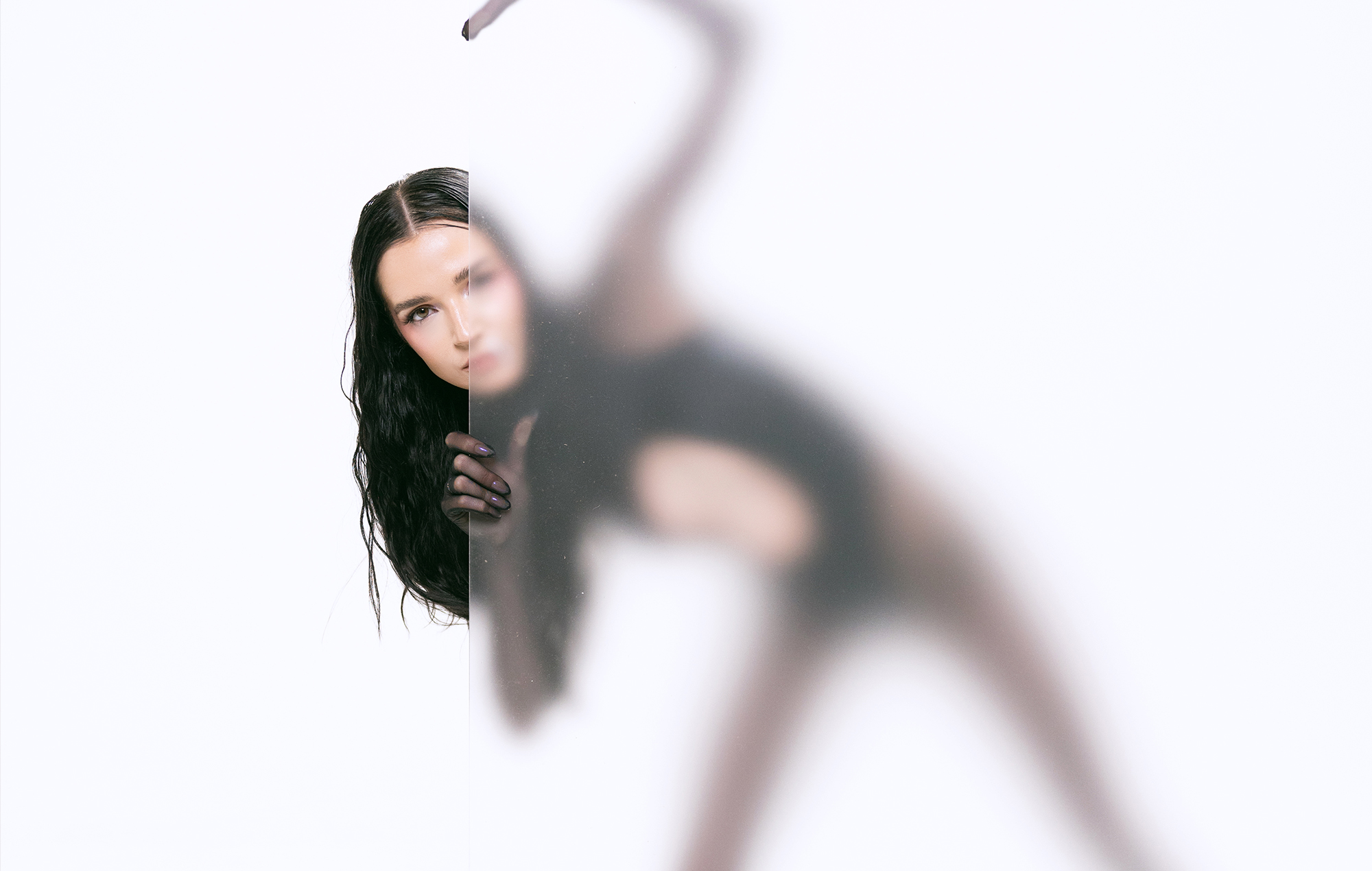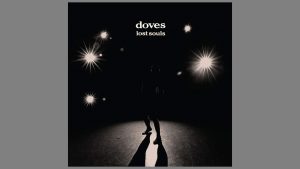For her brilliant, bracing new album ‘Zig’, dark-pop shapeshifter Poppy has teamed with Ali Payami, a producer who’s previously worked with Taylor Swift and The Weeknd. It’s a less unlikely collaboration than it seems, Poppy tells NME when we meet in a west London recording studio. “He’s a bit of an outsider, as I would consider myself to be, but I think we’re on the outside of the outside,” she says. “Like, if there was a room for the outsiders we’re sitting in the hallway because they won’t let us in there, either. So I like that about him.”
Poppy is happy on the peripheries and prides herself on staying as creatively “open” as possible. In 2016, she self-released an album of ambient music, ‘3:36 (Music To Sleep To)’, and her fascinating catalogue includes everything from punk to industrial, and synth-pop to shoegaze. In 2021, she made history when she became the first female solo artist to be nominated for Best Metal Performance at the Grammys (for her lacerating banger ‘Bloodmoney’). “I didn’t really come up in a group or a scene or anything like that,” she says in her soft-spoken voice, which has an ASMR-like quality. “I’ve always just been Poppy, floating around on the internet.”
Photo Credit: Angelo Kritikos
When she first floated to prominence a decade ago, Poppy adopted an android persona that piqued people’s interest and concealed her real identity. Today, we know she was born Moriah Rose Pereira in Boston, but has lived in LA since she was 18. During this interview, we also learn that Poppy is more of a homebody than she used to be and likes to unwind with Lego. “My phone just doesn’t exist to me [and nor does] anything happening in the background – I just zone in,” she says. One day, Poppy says she would “like to live in a Lego castle”.
For now, though, Preppy is preparing to tour in support of ‘Zig’. Next February, she will play seven UK dates, including two at iconic London venue KOKO. The album definitely lends itself to an uptempo live show: it’s a half-hour blast that includes some of Poppy’s catchiest bangers to date (‘Motorbike’, ‘Knockoff’) and the dazzling drum ‘n’ bass rave ballad ‘The Attic’, which inspired by Massive Attack and Portishead.
“I’ve been quite into Portishead for a number of years,” she says. “A guy that I worked with, when I was in Tennessee first learning how to write songs, gave me ‘Glory Box’ and said: ‘This is a very important album. You don’t have to give it back.’ And I think that changed a lot for me.”
So, settle down for a surprising and strangely soothing audience with the inimitable Poppy.
Photo Credit: Angelo Kritikos
One of our favourite songs on the album is ‘Motorbike’. What is it about the image of a girl on a motorbike that you find so powerful?
“Well, whenever I see a girl that’s on a motorcycle, I always stare a little bit longer at her – I always have. It could be interpreted as a very sensual song. It’s empowering to me, but I like that it’s the brightest song on the record. It doesn’t really take itself too seriously; it’s a little bit of a juggle moment.”
Do you like explaining your songs, or do you prefer to leave them for us to interpret?
“I prefer to let people interpret them. I feel like they change meaning over time and sometimes it’s a little bit too personal – not with ‘Motorbike’, that one’s not as close [to me]. But I feel like sometimes it gets a little bit washed out if you over-explain what a song is about to you. Because once it’s out there, it belongs to them, whoever they are.”
Can a song change meaning when you perform it every night on tour?
“Definitely. Certain songs I don’t play anymore, because they’re just a little bit too [evocative] of a certain time period. Like, I’m a fan of MGMT, and I know that they don’t play certain songs live anymore. I like a lot of their music, but it’s almost like a punishment to the audience in a way. Which is fun, too.”
Does your audience appreciate this punishment?
“I think they like the punishment – that makes them come back. Early on [in my career], I would loop for [pre-show] music the same song over and over again. It was a little bit like sonic waterboarding because then when I got to the stage, everybody was really excited. They were excited because they were at a Poppy show, but they were [also] excited because it was over and I was about to start. So I think it’s nice to give them all a little bit of punishment.”
On the song ‘Hate It’, you sing: “I’m impatient / I hate waiting.” Have you always been this way, and have you made peace with it?
“I think if I was too patient, I would be passive, and then nothing would happen and I would be boring. So I like to go do things immediately when I think of them.”
Photo Credit: Angelo Kritikos
Have you always been driven?
“I would say so. Yeah, in terms of weeding myself out of situations when I was small and a bit of a drifter type.”
What made you stop being a drifter?
“I got a house. And I have a cat. I do adventure with my cat, but I think I have an appreciation for having a home base now, which is something that I didn’t have previously. At the beginning of my journey in music, one thing that attracted me to the idea was the fact that you could never go home – you could tour the world and never have to stay in one place.
“And I was like, ‘That’s a job for me!’ But I do like having a home now. It’s a different feeling – like, you’re gone for months at a time, but you come back to one place and you have a bed there and it’s cosy.”
How do you view your purpose as a musician?
“My purpose? To better understand myself and maybe people can understand themselves a little bit better in the process. But I think I’m just trying to figure it out, and I’m honest about that.”
Has your purpose changed over time?
“Yeah, I think it’s become a bit more clear. It’s like when you’re looking [through] those little magnifying binoculars at a park and you turn the dial and it becomes a bit more in focus – that’s how I feel. Maybe at the beginning, it was just to make my friends laugh or to make my friends excited by my music and what I was doing. But then it turned to be more about the greater purpose of understanding myself.”
Photo Credit: Angelo Kritikos
When you first broke through, we didn’t know much about you. And it seems like you’re still quite careful about what you put out there, especially in terms of personal stuff. Do you have a very clear line in that respect?
“I think it’s important to keep secrets. And I think everybody’s very quick to put everything out there in an effort to maybe force a connection. I don’t think I have it all figured out, but I know it’s working for me right now.”
Do you pay attention to what people say about you? Do you fact-check your Wikipedia page?
“It’s not really a battle that seems worth fighting to me. I think there’s a lot of false information out there – about me, but about everyone. The unfortunate thing is that people can say and do whatever they wish. It’s great that everybody has access to the internet, but not everybody should [have access]. Not everybody should.”
What are you most proud of in your career?
“I feel like I’m most proud of my ability to be consistent in the things that I value. I don’t know if that’s as shiny of an answer as you were expecting.”
No, but it’s an authentic one. Still, an amazing shiny achievement you do have is becoming the first female solo artist to be nominated for Best Metal Performance at the Grammys. Did that feel special?
“It was definitely a moment that was a surprise to me, and very flattering for sure. It wasn’t what I expected, but I don’t think your goal should ever be to get an award. It’s just a by-product of things that you create sometimes, I guess. Yeah, it was wonderful, but there’s more to life than an award. Really, I just want to create things that didn’t exist before.”
Poppy’s new album ‘Zig’ out now via Sumerian Records
The post Poppy: “I want to create things that didn’t exist before” appeared first on NME.




